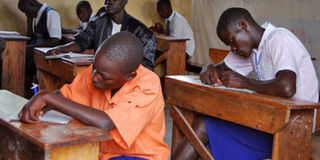Teachers, Education officials disagree over new curriculum

Candidates studying after they reported back to school last year. PHOTO/FILE
Teachers and the Ministry of Education officials are speaking at cross-purposes over a compressed curriculum, just weeks to reopening of schools for semi-candidate classes on March 1.
Whereas Mr Alex Kakooza, the Education ministry permanent secretary, says they have condensed the content for Terms II and III to fast-track teaching and learning, the teachers’ union dismisses the initiative as a non-starter.
“We are not operating under normal conditions. We are trying to do our level best [to develop a workable curriculum within time constraint,” Mr Kakooza said, adding that teachers will be oriented on the new curriculum in due course.
He declined to say when he expects the new curriculum to be ready – although he, without specifying the amount, said they require money to print copies and train teachers on the curriculum.
Without a ready curriculum, and schools set to reopen in slightly under two weeks, stakeholders including teachers remained apprehensive that class work that was uncovered when the government closed educational institutions last March, could be covered within the scheduled eight to 14 weeks term duration.
Mr Filbert Baguma, the Uganda National Teachers’ Union (Unatu) general secretary, said the original syllabus was designed and matched with time, meaning missed lessons even for a week would disadvantage learners to cope.
“When they (schools) reopen, each school starts from where they stopped. This is a new normal,” he said.
Mr Baguma said even candidates who reported to school last October and have had longer a study period ahead of their final examinations next month, were unable to complete the syllabus, as such introducing an abridged curriculum and packed class schedule will not work.
Investigations by this newspaper show that the teachers and Education officials are proceeding from different viewpoints.
Mr Kakooza said the ministry developed, printed and made available to children countrywide a curriculum to help them revise the uncompleted term I work when schools closed, suggesting more classwork was covered than is being acknowledged by the teachers.
That holiday programme, one President Museveni earlier called virtual or remote learning, remained wet in the wings as radio and television sets to facilitate the teaching and learning were not delivered to neighbourhoods in the country as promised.
Parents with the means instead engaged teachers to tutor their children at home while elite private and international schools shifted class work to online using mainly Zoom and Google’s Team platforms to teach pupils.
These kinds of disparities, which showed class differences in the country, has fed into concerns that the poor and rural children have largely been excluded from formal education during the entire period of schools’ closure.
Only about 25 per cent of that curriculum was rendered to pupils, mainly those in refugee camps, through a World Bank-supported programme.
In an interview yesterday, Ms Grace Baguma, the National Curriculum Development Centre (NCDC) executive director, said they are still developing a “catch-up programme” to assist teachers when they return to work on March 1.
“We are trying to work out a catch-up programme with the ministry which will help them to cover the lost time. Ask them (Education ministry officials) about that. But if they got those materials (home study), and as professional teachers, they (teachers) would be able to work out the way children can cover what is critical in the shortest possible time that they have,” she added.
NCDC developed the first post-schools’ closure curriculum with an understanding that the pandemic would peter out faster and when it did not, they returned to the drawing board to develop a curriculum covering all the content including what had already been covered before closure.
But Unatu’s Baguma remained critical.
“When they developed the (home study material), where did they begin from? Do they have assessment of where every school was so that they begin from there? Any sensible head of institution will progress the learner where they had reached and start from there,” he said.
Home study
In regard to Education ministry’s proclamation that they supplied the required materials for home study, Mr Baguma asked: “Did you see them giving the materials to candidate classes? Where? Let them not lie [to] the country.
What I know [is that during] lockdown, they (Ministry of Education) printed some material which was about 25 per cent of the learners. The materials didn’t reach everywhere; in some cases, one copy would reach a village.”
He claimed that it was impossible to cover pending classwork under an abridged curriculum, although he did not point at specific classwork that would turn out tragic if students missed on the teaching.
Mr Kakooza yesterday sounded confident that the learning materials that they developed covers the entire curriculum and will help bridge the gap when schools reopen.
“The [curriculum] that covers the entire curriculum are applicable when we go back. They will be the ones that are going to bridge the gap because we have very limited time. The teachers are going to use them to supplement what they are going to teach and …ensure learners progress,” he said.
In accounts offered yesterday, NCDC Executive Director Baguma said the materials they developed looked at critical competence which they believe should not be missed at any stage of learning. She provided no details.
A source, who declined to be named, yesterday said the ministry declined a proposal to fully reopen schools so that all the content last year is recovered together with what was expected to be taught in this academic year.




